“What’s Up, Dr. Mack?” Martians Go Home and the Ordeal of Civility
Martians, Go Home
by Fredric Brown
Dutton, 1955; Bantam, 1956
Ballantine Del Rey, 1976
Gateway Essentials, 2011
“But wherever they arrived and however they were received, to say that they caused trouble and confusion is to make the understatement of the century.”
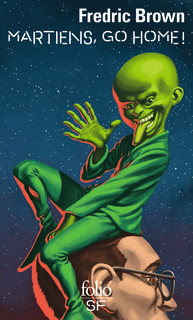 Many a science fiction book or film has a theme, or a debate therein, dealing with the question of whether “aliens” who are advanced enough to master space travel would, ipso facto, “come in peace.”[1] Are they like E.T., or Klaatu, or more like the Martians of the Wars of the Worlds of Wells and Welles?[2]
Many a science fiction book or film has a theme, or a debate therein, dealing with the question of whether “aliens” who are advanced enough to master space travel would, ipso facto, “come in peace.”[1] Are they like E.T., or Klaatu, or more like the Martians of the Wars of the Worlds of Wells and Welles?[2]
But what if they were smart, and indeed not warlike, but instead, just really, really annoying?
Such is the premise of this pulpy little novel by Fredric Brown,[3] whose alien visitors are described by Wikipedia thus:
The story begins on 26 March 1964. Luke Deveraux, the protagonist, is a 37-year-old sci-fi writer who is being divorced by his wife. Deveraux holes himself up in a desert cabin with the intention of writing a new novel (and forgetting the painful failure of his marriage). Drunk, he considers writing a story about Martians, when, all of a sudden, someone knocks on the door. Deveraux opens it to find a little green man, a Martian. The Martian turns out to be very discourteous; he insists on calling Luke ‘Mack,’ and has little in mind other than the desire to insult and humiliate Luke. The Martian, who is intangible, proves to be able to disappear at will and to see through opaque materials. Luke leaves his cabin by car, thinking to himself that the alien was but a drunken hallucination. He realizes that he is wrong when he sees that a billion Martians have come to Earth.
And here’s some more very suggestive details about these alien visitors:
They consider the human race inferior and are both interested and amused by human behaviour. Unlike most fictional Martian invaders, the Martians that Brown writes of don’t intend to invade Earth by violence; instead, they spend their wakeful hours calling everyone ‘Mack’ or ‘Toots’ (or some regional variation thereof), revealing embarrassing secrets, heckling theatre productions, lampooning political speeches, even providing cynical colour commentary to honeymooners’ frustrated attempts at consummating their marriage. This nonstop acerbic criticism stops most human activity and renders many people insane, including Luke, whose stress-induced inability to see the little green maligners divides opinion on whether he should be considered mad or blessed.
If this seems somewhat familiar, you may have had the misfortune of seeing the 1990 film, directed by David Odell and “starring” Randy Quaid and Margaret Colin — a movie so bad it hasn’t seen a Region One DVD release.[4]
But let’s stay with the book. Again, it may seem somewhat familiar, but for another reason: read with a Certain Eye, there are plenty of clues that these Martians are rather Semitic.
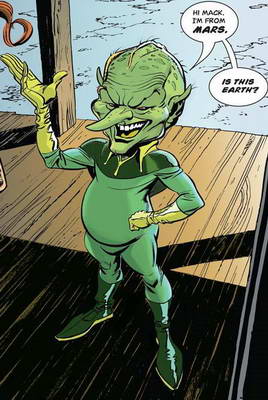 They are green, of course. But they are also scrawny, and bald, and have no ear lobes.[5] Most strikingly, they all look alike, differing only in relative size, male and female.[6]
They are green, of course. But they are also scrawny, and bald, and have no ear lobes.[5] Most strikingly, they all look alike, differing only in relative size, male and female.[6]
On Earth, at least, there are 1 billion, in the United States, six — I mean, sixty — million, one for every 3 Americans at the time.
And boy are they annoying.
They have no names themselves,[7] think our having names is stupid, and call everyone “Mack” or “Toots.” Their favorite, or at least most common, reaction to anything is “a loud raspberry, Brooklyn style.”[8]
And react they do. Such as the first words Luke hears:
“You people all live like this or are you what they call white trash?”
The effect on the entertainment industry is immediate and fatal to all enjoyment or even communication:
“They’ve been being — well, impolite here to us, but I know that when he knows he’s talking to millions of listeners, he’ll, well — Here, fellow, will you reassure our great audience?” A different voice spoke, a voice a little higher pitched than the announcer’s. “Thanks, Mack. What I’ve been telling you was to screw yourself, and now I can tell all these lovely people to — “ The station went dead.
Soon all radio and television broadcasts are nothing but crude insults; “they all sounded like poorly organized madhouses.” One by one all other industries and cultural institutions collapse as nothing can be done with the meddlesome Martians horning in.
And everywhere and in every way they invaded privacy. Privacy, did I say? There no longer was such a thing. And it was obvious, even that first night, that for as long as they stayed there would be no more privacy, no more secrecy, either in the lives of individuals or in the machinations of nations. Everything concerning us, individually or collectively, interested them — and amused and disgusted them.
They would admit to no political philosophy whatsoever and sneered at all of them.
They sneered equally at all terrestrial governments and forms of government, even theoretical ones. Yes, they themselves had the perfect form of government but they refused to tell anyone what it was — except that it was none of our business.
They weren’t missionaries and had no desire to help us.[9]
All they wanted was to know everything that went on and to be as annoying and irritating as they possibly could.
And they tattled so. No one can guess how many people were summarily tried and executed in Communist countries during the first month or two of the Martians’ stay.
War, oddly, becomes impossible; not because they bring the rule of some benevolent planetary federation, but because our generals “shuddered at the thought of fighting a war with the Martians gleefully helping both sides.”
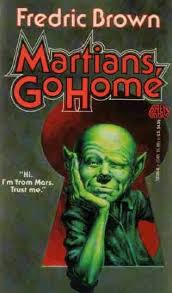 They do show one aptitude: linguistics. And they respond somewhat to “reverse psychology”:
They do show one aptitude: linguistics. And they respond somewhat to “reverse psychology”:
He realized this was exactly the wrong tack if he wanted the Martian to stay. He said, ‘Get the hell out of here then, if you feel that way.’ The Martian grinned. ‘That’s better. Now we’re getting somewhere.”
Animal lovers? Not really.
Animals, as such, did not interest them, although they did not hesitate to frighten or tease animals whenever such action would have the indirect effect of annoying or injuring human beings.
Horses have a particular aversion to the Martians; as a result, “horseback riding, either for sport or as a means of transportation, became so dangerous as to be impossible.”[10]
In short,
Mentally, the Martians were even more alike than they were physically, although again there was minor variation — some of them were even worse than others. But one and all they were abusive, aggravating, annoying, brash, brutal, cantankerous, caustic, churlish, detestable, discourteous, execrable, fiendish, flippant, fresh, galling, hateful, hostile, ill-tempered, insolent, impudent, jabbering, jeering, knavish killjoys. They were leering, loathsome, malevolent, malignant, nasty, nauseating, objectionable, peevish, perverse, quarrelsome, rude, sarcastic, splenetic, treacherous, truculent, uncivil, ungracious, waspish, [!] xenophobic, yapping, and zealous in making themselves obnoxious to and in making trouble for everyone with whom they came in contact.
As the preachers begin to realize, “’Martians! They are DEVILS, devils out of the foulest depths of hell, sent by SATAN, as is predicted in the Book of Revelations!’”
One especially interesting clue is that the Martians have a major, and initially devastating, impact on sexual congress. With Martians popping in to make sarcastic comments on their disgusting deeds[11] — and apparently able to see in the dark, and through curtains or blankets — the birth rate initially drops 97%. Eventually, human nature being what it is, intercourse resumes, aided by earplugs; but only within marriage, since the Martians love to rat out anyone committing adultery, having premarital relations, or, though unmentioned, I suppose any “unnatural” acts.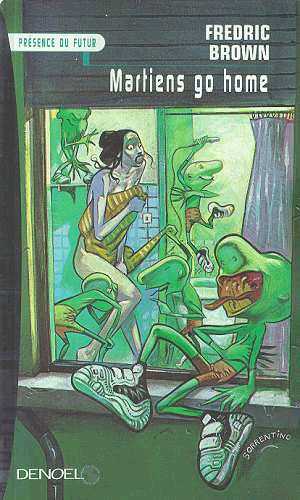
Thus, the Martians become the greatest enforcers of Judeo-Christian “family values;” sort of like having a neocon overseeing your sex life.[12]
One industry unaffected is … psychiatry. Professionals struggle with the impossible question of how to live with these pests.
“To ignore them completely — rather, to try to ignore them completely, to pretend that they aren’t there when so obviously they are, is a form of rejection of reality that can lead straight to schizophrenia and paranoia. Conversely, to pay full attention to them, to let yourself become seriously angry with them can lead straight to nervous breakdown — or apoplexy.”[13]
Incidence of insanity had dropped, they claimed, when it was fully realized that it was safe, mentally, to ignore Martians only up to a point. You had to swear back at them and lose your temper at them once in a while. Otherwise the pressure or irritation built up in you as steam builds up pressure in a boiler without a safety valve, and pretty soon you blew your gasket.
All else fails — even that old “UN-announces-we’ve-learned-to-unite-against-an-alien-foe,-which-must-have-been-your-beneficent-purpose,-O-artians,-so-please-go-now” trope is a bust.
Finally, an amateur crackpot named Oberdorffer —over a lunch of pigs knuckles and sauerkraut, no less — realizes that only an “anti-extraterrestrial subatomic supervibrator” will do the job; from the description of the build in his basement apartment (accompanied by several beers, of course), it rather resembles Mr. Krasker’s radio to talk with the dead.[14]
Oberdorffer’s device seems to do the trick; or does it? Brown presents several simultaneous alternatives: perhaps it’s the powerful juju (!) set up by an African tribe. Or perhaps it’s all in Luke’s head, an idea to which I will return.
All this will be rather familiar to any reader already familiar with Dr. Kevin MacDonald’s 1998 book The Culture of Critique: An Evolutionary Analysis of Jewish Involvement in Twentieth-Century Intellectual and Political Movements.
One interesting divergence, however, is that these aliens are not acting according to a group evolutionary strategy, as MacDonald argues. This of course makes the Martians even more infuriating to their unwilling human hosts; the Martians, it seems, are just assholes.[15]
In this, the scenario is closer to that of the 1974 book The Ordeal of Civility by Irish-American New York academic John Murray Cuddihy, which argued that the same Jewish intellectual movements MacDonald later studied are simply defensive actions prompted by the primitive, shtetl-dwelling Jews to the shameful encounter with the sophisticated modernism of the goyim. “Sure, my fingernails are filthy, but you’re just a hypocrite; and you secretly want to sleep with your mother!”[16]
From Solomon Maimon to Normon Podhoretz, from Rachel Varnhagen to Cynthia Ozick, from Marx and Lassalle to Erving Goffman and Harold Garfinkel, from Herzl and Freud to Harold Laski and Lionel Trilling, from Moses Mendelssohn to J. Robert Oppenheimer and Ayn Rand, Gertrude Stein, and Reich I and II (Wilhelm and Charles), one dominating structure of an identical predicament and a shared fate imposes itself upon the consciousness and behavior of the Jewish intellectual in Galut [exile]: with the advent of Jewish Emancipation, when ghetto walls crumble and the shtetlach [small Jewish towns] begin to dissolve, Jewry—like some wide-eyed anthropologist—enters upon a strange world, to explore a strange people observing a strange halakah (code). They examine this world in dismay, with wonder, anger, and punitive objectivity. This wonder, this anger, and the vindictive objectivity of the marginal nonmember are recidivist; they continue unabated into our own time because Jewish Emancipation continues into our own time. (John Murray, Cuddihy, The Ordeal of Civility, 1974, 68)
An even more up-to-date element is the economic and social effects on what, back then, was a 90% White America.
The collapsing economy and the sinking of a then mostly White America into alcohol, crime, suicide and drugs is eerily like the decay of the White working class we are in the midst of.[17] As TakiMag writes:
In 2015 Anne Case and Angus Deaton published a report that revealed working-class whites, unlike all other groups in America, were experiencing increased mortality rates due largely to causes such as suicide and substance abuse. They’ve now published a follow-up report which blames such “deaths of despair” on the twin demons of automation and globalization:
Ultimately, we see our story as about the collapse of the white, high school educated, working class after its heyday in the early 1970s, and the pathologies that accompany that decline….These changes left people with less structure when they came to choose their careers, their religion, and the nature of their family lives. When such choices succeed, they are liberating; when they fail, the individual can only hold him or herself responsible.
In an interview with NPR, Deaton reveals that when it comes to mortality rates, “poorly educated whites have now taken over from blacks as the lowest rung of society.”
No mention of Martians, though.
Martians, Go Home is not a Great Work of Literature or even of Sci/Fi, like a Dune or Stranger in a Strange Land.[18] It’s a short enough novel that the gag doesn’t quite start to wear out, and will entertain for couple of afternoons.
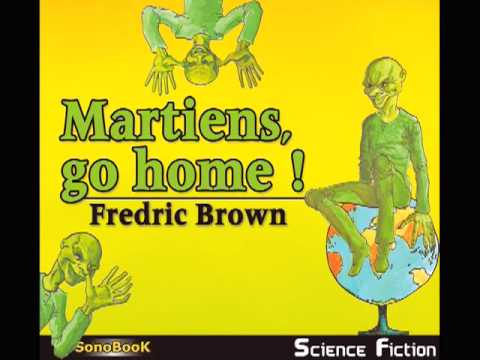
It’s really more of a fantasy novel than science fiction, as I understand the genres, since Brown doesn’t really feel the need to explain the Martians’ powers and abilities by known laws or even invented ones; the key power of kwimming is just one they have, although they have only just now learned to employ it at great distances, like from Mars to Earth.[19] Other powers, like the ability to read sealed letters, even in safes, is pulled out when needed, like a Silver Age DC comic. Brown even starts with a “future in a few years” prologue that notes Einstein has been refuted, and faster than light travel is possible.[20]
Brown is also not a one trick pony, or an ideologue pounding out a thesis. Little hints start to come that he’s going Phildickian on us,[21] and by the end Brown seems to have wandered into New Age territory: are the Martians really just in Luke’s head? If so, then
All he had to do was get the message to his subconscious mind.
Easier said than done; “even though he knew he was right, he lacked sufficient faith in himself.”
Eventually, he succeeds; or is it the simultaneous application of the supervibrator? Or the African Juju. Whatever, from now on “Luke is being very careful indeed how he lets his imagination work.” And as the author adds in his Postscript:
Luke is right; the universe and all therein exists only in his imagination. He invented it, and the Martians. But then again, I invented Luke. So where does that leave him or the Martians? Or any of the rest of you?
Even this, airy-fairy though it may sound, has solid contemporary relevance: for this appeal to the power of faith and the imagination is what Donald Trump learned from his spiritual guide, Dr. Norman Vincent Peale,[22] and what lies behind the forces of meme magick.[23]
So if you’re looking for some old-school science fiction, with a high J-Q and even some ripped-from-the-headlines musings, have I got a book for you, Toots!
Just to be clear, I don’t think Frederic Brown was an “anti-Semite,” or was secretly an “anti-Semite” trying to put his view across in some harmless, Animal Farm type allegory. What I find more interesting is that here, as with Olaf Stapledon’s The Flames, we have someone using the rhetorical trope of an imaginary invasion and culturally critical attack, and almost unconsciously producing an objective portrait of a Certain Tribe. Funny, ain’t it, Mack?
[1] Discussing the John Carpenter remake of The Thing, a friend of mine pointed out that the “things” in both films seem like homicidal monsters, and that the space craft must have been piloted by an advanced, presumably peaceful being who was itself the first victim of the Thing, hence the crash landing. Similarly, in Alien, the dead civilization discovered by the crew of the Nostromo must have been destroyed by the titular Alien, not produced by it.
[2] Or if they initially come, talking of “master races” and having “no concern for foreign beings,” to colonized the Earth as feeding grounds for their “gargon herds,” perhaps one of the crew is a dreamy teenager who will come to understand our “love” and thwart his father’s invasion plans; see Teenagers from Outer Space (Tom Graeff, 1959).
[3] Not familiar to me, Brown gets around. According to Wikipedia, “Arena,” a science fiction short story first published in the June 1944 issue of Astounding magazine, “in effect recreates, under new circumstances, champion warfare: a type of battle, common in the epic poetry and myth of ancient history but extinct in modern wars, in which the outcome of the conflict is determined by single combat, an individual duel between single soldiers (“champions”) from each opposing army; “ it was chosen by members of the Science Fiction Writers of America “as one of the best science fiction stories published before the advent of the Nebula Awards, and as such it was included in The Science Fiction Hall of Fame Volume One, 1929-1964. The Star Trek episode “Arena” had some similarity to this story, so to avoid legal problems, it was agreed that Brown would receive payment and a story credit.” A not unusual occurance. “An Outer Limits episode, “Fun and Games”, also has a similar plot, as does an episode of Blake’s 7, titled “Duel”.”
[4] Failed comedies seldom have the fortune to fall into the “so bad it’s good” cult category; see the remarks on The Wild Wild World of Batwoman, here. Oddly enough, Quaid and Colin went on to have roles in the more conventional, and vastly more successful, Independence Day, which was also co-written by Martian co-star Dean Devlin.
[5] Like Blofeld! See Jef Costello, The Importance of James Bond (San Francisco: Counter-Currents, 2017).
[6] IF there are any females. How the Martians reproduce is a mystery; some speculate that they just grow on trees, like coconuts.
[7] “Historically, Jews did not have permanent family surnames at all. Within the Jewish community, we used patronymics, such as David ben (son of) Joseph or Miriam bat (daughter of) Aaron. Names in that form are still used in synagogue and in Jewish legal documents such as the ketubah (marriage contract), but are rare outside of the religious context. Family names began to gain popularity among Sephardic Jews in Spain, Portugal and Italy as early as the 10th or 11th century, but did not catch on among the Ashkenazic Jews of Germany or Eastern Europe until much later.” Judaism 101, here.
[8] I think he means Bronx, as in “Bronx Cheer.”
[9] “Woe to you, scribes and Pharisees, hypocrites, because you travel about on sea and land to make one proselyte, and when he becomes one, you make him twice as much a son of hell as yourselves,” Matthew 23:15. Contemporary Judaism is noted as no longer being a proselytizing religion, although there is some dispute over the meaning of the term. They seem to be doing OK among the Trumps, though.
[10] After some initial fighting, cats learn to ignore the Martians; “but then cats have always been different.”
[11] “I’ve heard about your disgusting mating habits. Now I can watch them.”
[12] Auberon Waugh once protested the modern idea of the Church endorsing sex, conjuring up the picture of “Saintly Fr. O’Bubblegum leanin’ in the window and blessin’ the union.”
[13] “It was through the study of children and their reaction to Martians that I have formulated most of my theories.“
[14] “Krasker’s radio to the dead, however, looks like a crumpled ball of tinfoil glued onto a skillet. This is connected to an electric stove top mounted on a wall. Impressive technology, but I wouldn’t advise the otherworldly equivalent of holding one’s breath waiting for this thing to work.” Cinedome, Jan. 24, 2015, here. See more about The Dead Talk Back (Gould, 1956) here, as well as in this review of Jason Reza Jorjani’s Prometheus and Atlas (London: Arktos, 2016), here.
[15] It’s kind of a mashup of the South Park episodes “Jakovasaurs” and “Goobacks.”
[16] Matthew Wiener’s series embodies the same strategy of presenting the WASP as a fake and a phony. As usual, crypsis is invoked: it is old-family WASP Pete Campbell who tries to expose Don Draper, while rather than show the Jewish takeover of Madison Avenue, Don’s firm is bought out by the Irish Catholics of bigger rival agency McCann (another green alien!).
[17] The narrator introduces a despondent President who “had not thought it was a bad thing to be elected President when it happened in 1960,” but I guess JFK found that out as well.
[18] Brown was one of three dedicatees of Heinlein’s novel. In addition to being reprinted in the Gollancz Masterworks series, the French apparently love it. According to Wikipedia, “The novel is considered a classic of science fiction by the following works of reference:
- Annick Beguin, Les 100 principaux titres de la science-fiction, Cosmos 2000, 1981;
- Science-fiction. La bibliothèque idéale, Albin Michel, 1988;
- Enquête du Fanzine Carnage mondainauprès de ses lecteurs, 1989;
- Lorris Murail, Les Maîtres de la science-fiction, Bordas, coll. « Compacts», 1993;
- Stan Barets, Le science-fictionnaire, Denoël, coll. « Présence du futur », 1994.”
Well, I’m impressed! Coincidentally, the South Park “Jakovasaur” episode ends with “the Jakovasaurs on tour in France looking for “the pyramids” when Jakov trips and crashes into a cafe full of French people. Rather than getting annoyed, the French people instead laugh and remark on how he reminds them of Jerry Lewis.”
[19] Puzzling over the Martians, “many people and especially scientists” suggest that “kwimming was simply the ability to project and astral body that was visible but not corporeal.” These psi-friendly scientists have perhaps been reading their world’s equivalent of Jason Reza Jorjani’s Prometheus and Atlas (London: Arktos, 2016).
[20] Einstein wrong? Anti-Semite!
[21] Wikipedia says that “His 1945 short story “The Waveries” was described by Philip K. Dick as “what may be the most significant—startlingly so—story SF has yet produced,” but provides no citation.
[22] “Faith plus dynamic dreams plus real working at it is a go-ahead formula that gets you where you want to go.”
[23] See here for more on Peale, Trump and the power of imagination.





Comments are closed.